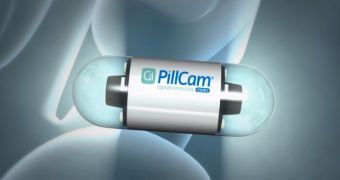Food, drink and medicine have been the only things meant to be swallowed for eons, barring some particularly invasive tubing related to intensive care and life support, but now the FDA has approved the use of something new.
Specifically, the US Food and Drug Administration (FDA) has given the green light to the use of the PillCam Colon pill-sized camera.
About as large as a normal pill, it is meant to be swallowed so that it may pass through the entire gastrointestinal tract.
That way, it will be able to perform colonoscopies without any orifices being probed. Colon cancer should, thus, be much more easily detectable from now on.
Normally, an endoscope is used to do this, a long and very thin camera inserted through the opposite end of the digestive apparatus.
Incomplete colonoscopies occur each year in the hundreds of thousands. Around 750,000 happen each year in the US alone.
Also, very often they involve X-ray or CT scans, in order to complete the colorectal examination. This raises both costs and risks.
The PillCam Colon will do all of that without bringing the patient any extra harm. It can identify hyperplastic polyps and adenomas at least 6 mm in size.
The PillCam Colon measures 12 x 33 mm / 0.47 x 1.3 inches and captures color video from both its ends at 4 to 35 fps. An LED casts light around it, allowing images to actually be captured. Footage is wirelessly relayed to a recording device strapped to the patient. The whole procedure needs about 10 hours to complete.
"We have made tremendous strides in increasing the number of people who are getting screened for colon cancer, starting at age 50 for the average risk individual," says Eric Hargis, CEO of US patient advocacy and support organization Colon Cancer Alliance.
"Colonoscopy is the most comprehensive option, but for up to 10 percent of individuals, achieving a complete colonoscopy may not be possible. For those individuals, PillCam Colon capsule endoscopy could be an effective option to allow their gastroenterologist to complete a colon examination."

 14 DAY TRIAL //
14 DAY TRIAL // 